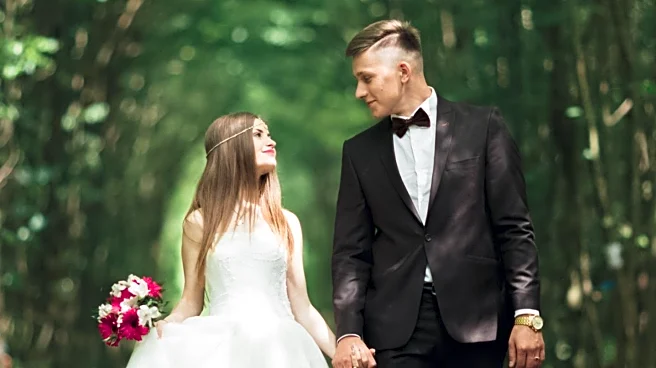What is the story about?
What's Happening?
A bride has been labeled a 'bridezilla' after imposing a strict dress code on her wedding guests, sparking debate online. The dress code, outlined in the wedding invitation, prohibits guests from wearing certain colors such as black, white, ivory, red, gold, champagne, teal, and orange, and bans jeans and hoodies. Instead, guests are asked to wear deep forest greens, olive green, mauve, navy blue, and earthy neutrals. The invitation warns that guests wearing inappropriate attire will be asked to leave. This has led to criticism from social media users, who find the demands controlling and disrespectful. Some guests, particularly those needing plus-size dresses, have expressed difficulty in finding suitable attire within the restrictions.
Why It's Important?
The controversy highlights the growing trend of social media influencing personal events like weddings, where aesthetics are prioritized over guest comfort. This incident underscores the societal pressures to conform to curated images for online platforms, potentially alienating guests. It also raises questions about inclusivity, as the dress code may disproportionately affect those with limited access to specific clothing sizes or styles. The backlash reflects broader societal discussions on the balance between personal expression and social expectations, especially in events meant to celebrate relationships and community.
What's Next?
As the debate continues, it may prompt future brides and grooms to reconsider the implications of imposing strict dress codes on their guests. Wedding planners and industry professionals might see a shift in client demands, focusing more on guest experience rather than social media presentation. Additionally, this could lead to discussions about the financial burden placed on guests to adhere to such demands, potentially influencing how weddings are planned and executed.
Beyond the Headlines
The incident may also spark conversations about the ethical considerations of using personal events for social media clout. It raises questions about the authenticity of experiences shared online and the impact of digital validation on personal relationships. This could lead to a cultural shift where individuals prioritize genuine interactions over curated online personas.

















